News & Media
Keeping e-tutors at the cutting-edge of ODeL trends
The story: Unisa launches a new programme to provide e-tutors and academics from other universities with the necessary skills for advancing student learning within an open, distance and e-learning context.
What was said: "The programme will ensure that e-tutors have key competencies, which include knowledge and application of various pedagogies appropriate for the university’s context, as well as the capacity to choose and use appropriate technology to support students more effectively" - Prof Matshepo Matoane: Director of Instructional Support and Services.
Why it matters: An open approach implies that the courses can serve a national priority in terms of assisting SA universities to transition to the online space, thereby critically repositioning Unisa as the leading ODeL institution.
"The development of e-tutors is critical in the university’s pursuit of increasing student success rate and student retention. This is because while we assume that e-tutors possess sufficient content knowledge, they may not necessarily have the critical competencies that are required to provide online student support."
Addressing this issue, Prof Matshepo Matoane, the Director of Instructional Support and Services in the Department of Tuition Support and Facilitation of Learning (DTSFL) and the programme’s project leader says: "Since the inception of the Unisa Integrated Tutor Model (ITM), in 2013, we have experienced a challenge of low uptake of e-tutorials by students."
Matoane explains that distance education creates what Michael Moore terms "transactional distance", which refers to a cognitive distance between students and the study material. She says that employing e-tutors to support students is one way of narrowing transactional distance for them by having students actively engage with their course content and test it out with their peers through the support of e-tutors.
Increase student participation in e-tutorials
Funded by a Department of Higher Education and Training (DHET) University Capacity Development Grant (UCDG) for the years 2018 to 2020, this programme aims to develop a new generation of open, distance and e-learning (ODeL) tutors to enhance student support for success at undergraduate level.
Matoane adds: "We took advantage of the DHET funding to elicit the needs of students, lecturers and e-tutors, hence the programme is informed by feedback from these stakeholders."
THEN: Face-to-face training
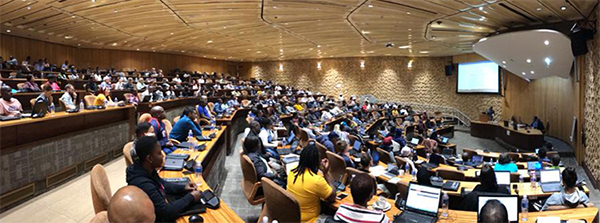
Muckleneuk Campus on 29 February 2020
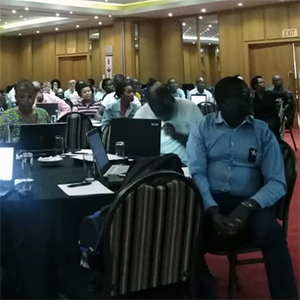
Muckleneuk Campus on 27 February 2020 |
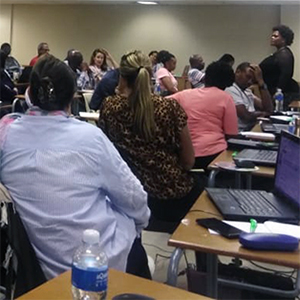
Durban Regional Campus on 9 March 2020 |
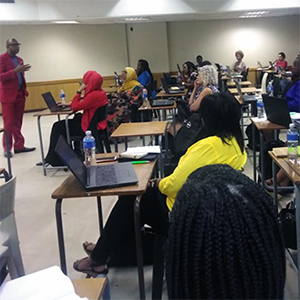
Durban Regional Campus on 10 March 2020 |
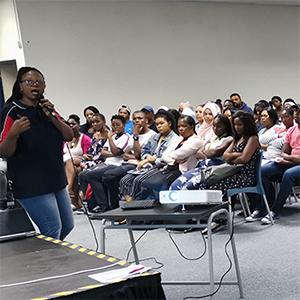
Cape Town Regional Campus |
"The programme addresses the gaps and needs identified by key role players in the university to increase students’ participation in e-tutorials," says Matoane.
She says that it will ensure that e-tutors have key competencies, which include knowledge and application of various pedagogies appropriate for the university’s context, as well as the capacity to choose and use appropriate technology to support students more effectively.
Engage with a diverse group of students
Matoane asserts: "A thread running through our entire programme is the e-tutors’ ability to engage with a diverse group of students who have a variety of needs, including students with special needs." Thus, she continues, "the impact from this perspective will be to contribute towards national skills development by producing a new generation of teachers who are able to function within the 21st century."
According to the project coordinator, Denzil Chetty, who is also from Unisa’s Directorate of Instructional Support and Services, "the new tutor development programme offered on the Unisa Open Learning portal has attracted many academics from contact-based universities that are now compelled to think about online offerings."
Affirming the importance of this foundational course, Chetty says that the basics of e-tutoring in an ODeL environment highlights critical skills needed in terms of pedagogy as well as student support. "This course addresses a national priority," he asserts.
Through its open philosophy, it allows for academics from other universities to tap into the course and quickly access critical skills to transition to the online space.
Chetty says: "The programme will further position Unisa as a leading ODeL institution, because we provide critical skills transfer to other universities in the country."
Create opportunities to learn in new ways
"The benefits of distance learning are that it is not dependent of place and time and uses asynchronised communication tools and creates opportunities to learn in new ways with powerful technologies," says Mu'eedah Armien, who is a Communication Science e-tutor.
She further says: "Amidst this crisis of Covid-19, the notion of student support has become more important in the university and communication has become even more crucial. E-tutor roles are more emphasised and form an essential factor in how we address teaching and learning now."
NOW: Webinar in Port Elizabeth
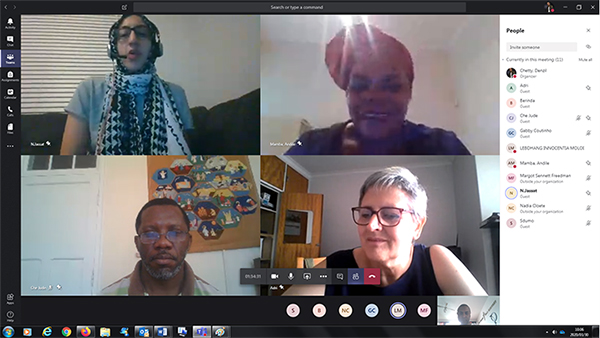
Online training on 23 March 2020
The team behind the project commissioned by Unisa’s Prof Oupa Mashile, Executive Director of DTSFL, researched and discovered that continuous professional development training is needed to build skills of e-tutors, which keeps them at the cutting-edge of ODeL trends. They also realised that there is a need for a blended delivery approach.
An open approach implies that the courses can serve a national priority in terms of assisting universities to transition to the online space, thereby critically repositioning Unisa as the leading ODeL institution.
Addressing the pedagogical roles in an ODeL environment, the discoveries showed lack of understanding of the pedagogical role of a tutor; knowledge and application of ODeL pedagogies; and ability to design inclusive online tutoring spaces, as well as the technological, social and managerial roles that form the core competencies of e-tutors.
Shift from ODL to ODeL
Since the national lockdown, face-to-face training workshops were moved to online webinars using Microsoft Teams, and 484 tutors participated in training that supplemented the online course.
The programme has four short learning courses to address the identified challenges which range from basics, advanced, face-to-face and core skills of e-tutoring in an ODeL environment.
Open philosophy
The courses use a massive open online course (MOOC) approach for 8 to 10 weeks. Open enrolment implies participants can register at any time, thus allowing for academic colleges to identify and send through e-tutors for training throughout the year. An open approach also implies that the courses can serve a national priority in terms of assisting universities to transition to the online space, thereby critically repositioning Unisa as the leading ODeL institution.
Structured assessment
The courses include a structured formative (40%) and summative approach (60%). This contains submission of assignments and a portfolio. Each course is aligned to relevant NQF levels, with the aim of eventually moving towards a MOOC "badging" system.
Africanisation
The courses include content from leading distance learning scholars and it involves international and regional scholars. In addition, the courses foreground ubuntu as part of the online strategy to develop a community of learners’ model.
Evaluation of tutor impact on students
An assessment will be conducted through student surveys to ascertain the tutor impact on students’ learning process and to determine whether the new skilled tutors are providing a more engaged learning experience.
So far, the programme has implemented MOOC015, Basics of e-tutoring in an ODeL environment. To date this MOOC has attracted 1 067 participants, differentiated according to new tutors, existing tutors doing the course as a refresher and consumers of public knowledge (through the open learning space). The rest of the short courses will be rolled out by the end of this year as the lifecycle of the project comes to an end.
Please click here for more information about the MOOC.
* By Lesego Ravhudzulo, Journalist, Department of Institutional Advancement
Publish date: 2020-05-09 00:00:00.0


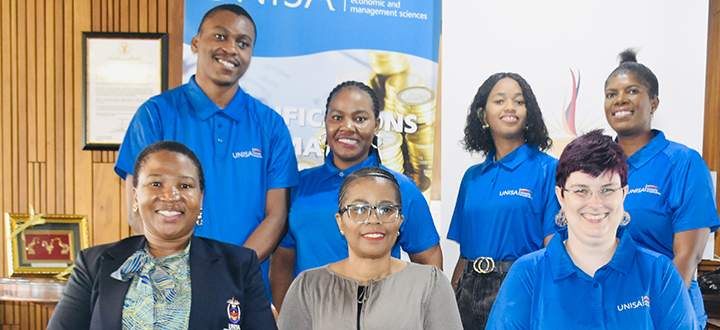 Unisa VC expresses pride in students heading to global challenge finals
Unisa VC expresses pride in students heading to global challenge finals
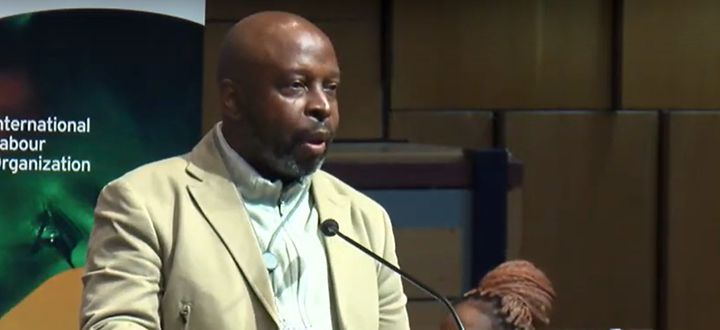 Thoughtful integration of digital tools can lead to safer workplaces – ILO specialist
Thoughtful integration of digital tools can lead to safer workplaces – ILO specialist
 Unisa and UBU Metaverse pioneer immersive learning experiences with groundbreaking digital twin events
Unisa and UBU Metaverse pioneer immersive learning experiences with groundbreaking digital twin events
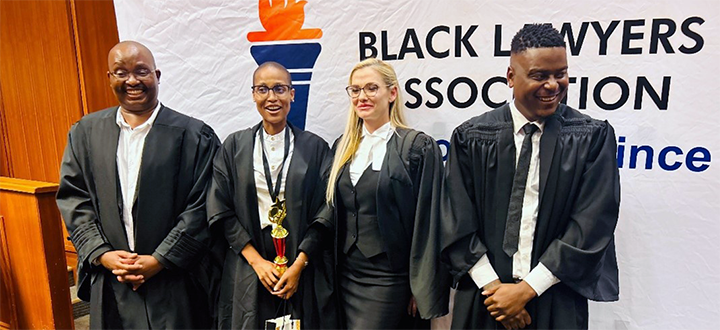 First-year LLB student crowned best mooter
First-year LLB student crowned best mooter
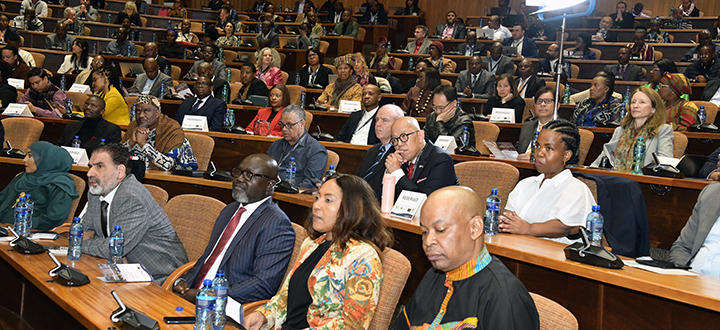 Unisa hosts launch of powerful multisectoral forum at the G20 Africa Investment Summit
Unisa hosts launch of powerful multisectoral forum at the G20 Africa Investment Summit